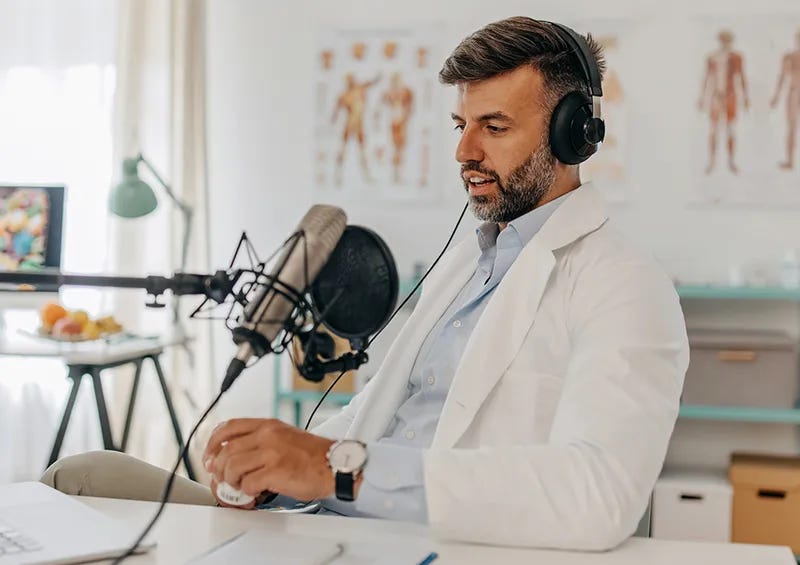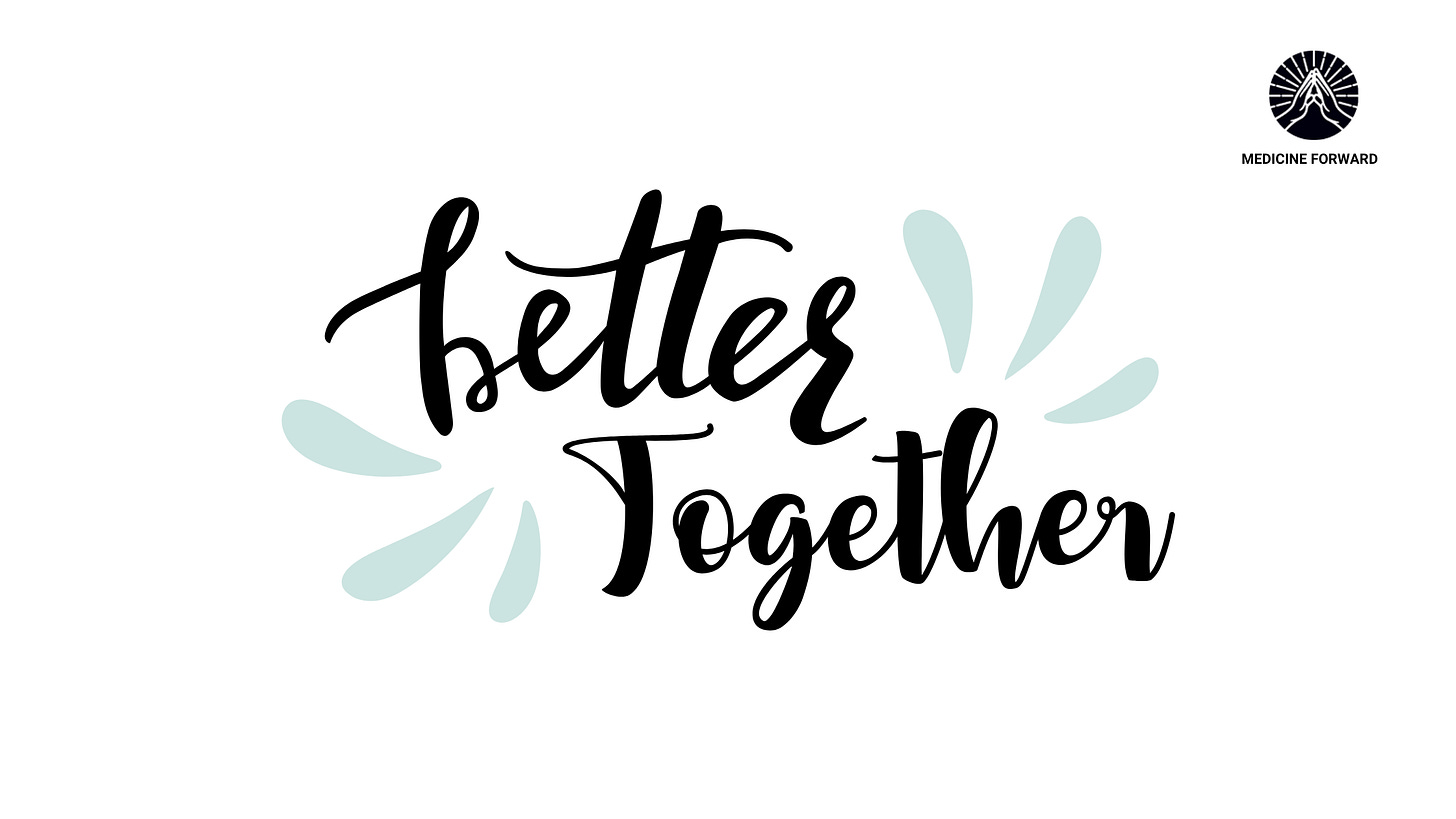When Healing Breaks Down: Stories of Trust, Burnout, and the Will to Rebuild
This month, we share personal reflections on system failures—and how presence, purpose, and resilience can help rebuild trust in healthcare.
May 2025
Dear Medicine Forward Community,
When the Nurse Couldn't Heal Herself: A Story of Systemic Failure and Hope
At Medicine Forward, we believe real change starts with the courage to tell the truth. This month, we are honored to share a powerful first-person reflection by Kimberly Maurer, BS, LPN, titled When the Nurse Couldn't Heal Herself.
Kimberly’s story reveals the painful human cost of a healthcare system under pressure—where rushed decisions, fractured trust, and missed moments of compassion leave lasting scars. Her journey challenges all of us to re-center presence, listening, and humanity in every patient encounter.
You can read Kimberly’s full story below.
Unseen, Unheard, Unrescued — Healing the Human Cost of Healthcare’s Collapse
Author: Kimberly Maurer, BS, LPN
Healthcare is built on science, skill, and trust. Yet when a clinician becomes a patient, a harsh reality emerges: trust can fracture under a system strained beyond human limits.
I never expected to be on the other side of the hospital bed. During my honeymoon, after a COVID-19 exposure, I developed debilitating symptoms—sensory overload, anxiety, weakness—that defied easy explanations. Emergency departments became familiar stops, but instead of help, I encountered rushed assessments and premature dismissals.
"You're just anxious."
"Nothing's wrong."
After six months of advocating for myself — through countless ER visits and specialist referrals — an MRI finally revealed a brain tumor. Even then, post-surgical complications were missed. I sought answers across two states and at prestigious institutions, but the pattern repeated: symptoms documented, suffering dismissed.
As a nurse, I understood the overwhelming pressures clinicians face. I didn't blame individuals; I blamed a system that demands speed over presence, metrics over humanity.
After relocating to Florida and joining a new health system, I hoped for healing. Instead, mandated vaccination triggered another health collapse. Short-term disability turned to long-term despair. I battled not just illness, but invisibility—crushed under paperwork, denied compassion, and pushed to "recover" on paper before I was ready.
The deepest wound wasn’t physical; it was the fracture of trust.
Lessons for Emergency Nursing:
Trust the patient's voice. Stay curious, even when data looks normal.
Slow down when it matters. One extra moment can change everything.
See beyond symptoms. Emotional distress is a clinical finding, too.
Prioritize connection over routine. One genuine interaction can restore hope.
Healing healthcare starts with returning to our roots: to listen, to see, to care beyond the chart. True healing begins when we dare to truly see each other again.
And that healing?
It starts with us.
Tools for Enzymatic Doctors- How to Be an Effective Catalyst
Solutions Hiding in Plain Sight
Being an effective change agent often feels like hard work. This is particularly true when you feel like part of your job is to provide the “solution” to whatever challenge it is that you’re working on. In that case, you first need to have the evidence to support the solution you’re recommending. Then you need to come up with the approach(es) needed to help people want to adopt what you’re telling them should be done. This typically requires multiple attempts on your part as (hopefully) there is gradually a larger and larger proportion of people who are experiencing the challenge who eventually see the wisdom of your advice and do what you have suggested.
What if there were alternatives to this approach? What if it wasn’t your job to decide what the solutions are at all? What if, in fact, those solutions are already out there, producing their benefits, and the people struggling with the challenge have no idea that these solutions even exist? Then your job is to help them discover what’s already working for themselves and choose to dip their toe into the water of change, ultimately deciding for themselves if this would make their lives better. This is the framework known as Positive Deviance (PD).
PD is defined thusly: In every community (whatever you choose to think of as a community) there exist individuals and small groups whose uncommon practices enable them to get different/better outcomes than the norms, even though they face the same barriers as everyone else and have access to no extraordinary resources compared with everyone else. So these are internal best practices. These behaviors deviate from the norm in a positive way. What makes this different from the usual way the term “best practices” gets used is that these PD practices come from the community experiencing the challenge. They’re not imported from somewhere else. This is not about “scaling” someone else’s solution, or even implementing someone’s new idea that they just thought up. It’s about helping people discover that not everybody in their community is experiencing this challenge like they are. Someone(s) is getting better results than I am, and I could possibly do what they are doing and get the same benefits.
The PD approach has been utilized for many serious, seemingly intractable challenges around the globe. A few examples include:
Childhood malnutrition
HIV transmission in sex workers
High school dropout rates and truancy
Healthcare-associated MRSA infections
Recidivism in incarcerated adults
So think of a challenge that you/your organization or team has been struggling with. Instead of thinking something like, “We have a serious problem of _____,” do what one of the fathers of PD, Jerry Sternin, referred to as “standing it on its head” and reframe the question like this: “Does anybody ever get a different better outcome pertaining to ____?” If the answer is no, then you truly need to create a new sensation. But if the answer (as it usually is) is yes, then you can begin the PD discovery process, looking to shine the light on what’s already working but hiding in plain sight.
Interested in learning more about PD/how to use it? Feel free to email Jeff Cohn at cohnjb827@gmail.com.
The Medicine Forward Rising Star Program: Amplifying Passions and Voices
Medicine Forward is thrilled to announce the launch of our innovative Rising Star Program, designed to empower healthcare professionals passionate about physician wellness. This structured program provides the resources, platforms, and support needed to transform your advocacy ideas into meaningful action.
The Rising Star Program offers three distinct tracks tailored to different communication styles and interests:
Podcast Track: Participants will be featured as guests on three podcast episodes, sharing their insights and experiences with a wide audience.
Author Track: Members will receive support to author three articles published across multiple platforms, including the Medicine Forward newsletter, LinkedIn, etc.
Speaker Track: Contributors will develop and deliver three presentations, including both asynchronous content and live workshops, to varied audiences.
What sets this program apart is our dedicated support system. Each participant is paired with a Medicine Forward intern who taps into the support teams to provide resources, help with content development, and ensure the smooth execution of all activities. We handle finding venues, providing templates and guidance on crafting content, booking the events, and promoting the material on social media to amplify your passion as much as possible. The program is designed to be accessible for busy healthcare professionals.
As participants progress through the tracks, they advance through three levels of achievement: Apprentice (completion of one track), Journeyman (two tracks), and Master and Mentor (all three tracks). Those reaching the Master level join our mentor database to guide future participants.
Join us in this groundbreaking initiative to amplify voices in physician wellness and create lasting change in healthcare. Together, we can build a stronger, more resilient medical community.
This content was created as part of the Medicine Forward Rising Star Program, which empowers healthcare professionals to share their expertise and advocate for healing healthcare. We are grateful for their contributions to building a stronger, more resilient medical community.
You can visit the Medicine Forward homepage here. We are currently planning a launch date in September 2025 and invite you to explore the Rising Star Program.
Practices of the Healthcare Athlete: A Framework for Sustainable Well-being
Medicine Forward is proud to spotlight the work of Dr. Darin Davidson, an orthopedic surgeon and advocate for clinician well-being. Dr. Davidson has developed The Practices of the Healthcare Athlete, a framework designed to equip healthcare professionals with strategies to leverage their biology in the pursuit of health, sustainable high performance, and resilience—both personally and professionally.
By cultivating mind-based and body-based skills, the framework empowers individuals to optimize their physiology and psychology to meet the demands of high-pressure environments. It also offers a biologically consistent understanding of burnout and practical approaches to address it—critical insights for healthcare workers navigating today's challenging systems.
Dr. Davidson’s paradigm draws from his article series, The Healthcare Athlete, available through Substack and his website. These resources offer weekly reflections on performance, well-being, and sustainable practice. Additional online tools—including CME/CE-accredited reflective learning programs and downloadable strategies—are available to help clinicians put these concepts into action.
The Practices of the Healthcare Athlete invites healthcare professionals to reframe how they care for themselves and others: not as an afterthought, but as a foundation for lasting, meaningful impact.
Learn more and explore Dr. Davidson’s work: Visit here
Support What Matters Most
At Medicine Forward, we know that meaningful change in healthcare doesn’t happen alone. It takes a community—of patients, physicians, and advocates—committed to putting human connection at the center of care.
Whether it’s uplifting Catalyst Stories, supporting bold projects like Suck It Up, Buttercup, or amplifying voices often left unheard, everything we do is powered by people like you.
A $5 membership helps sustain this growing network and fuels the work ahead. Looking to deepen your involvement? Become a paid Substack subscriber to help us keep publishing stories that matter, building community, and driving transformation.
🔗 Become a Member
Let’s move healthcare forward—together.
Thank you,
Gabe Charbonneau, MD, Co-founder, Medicine Forward
Todd Otten, MD, Lead Catalyst / Board Chair, Ripple of Change
Lisa Scardina, Strategy and Implementation, PS&D Recruitment
Jeff Cohn, MD, Mental Fitness & Leadership Coaching Officer, Care to Change Coaching
Kim Downey, Community Ambassador, Stand Up for Doctors
Eva Lana Minkoff, Director of Healthcare Relationship Initiatives, Bold Being
MaryAnn Wilber, MD, MPH, MHS, Public Health Strategist, The Doctor Is No Longer In Emee Vida Estacio, PhD, CPsychol, SFHEA, Psychologist and Author, “Fear Is Not My Enemy”
Nimra Savanghan, Digital Content and Collaboration








Burnout is what got me writing in the first place. The burnout rate in the ED is only increasing.